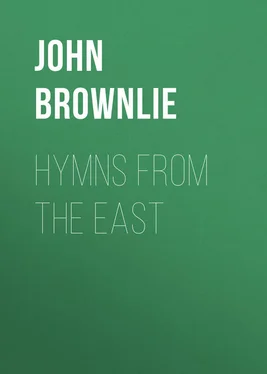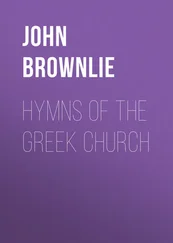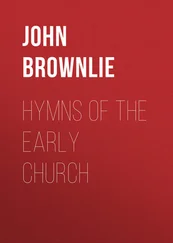John Brownlie - Hymns from the East
Здесь есть возможность читать онлайн «John Brownlie - Hymns from the East» — ознакомительный отрывок электронной книги совершенно бесплатно, а после прочтения отрывка купить полную версию. В некоторых случаях можно слушать аудио, скачать через торрент в формате fb2 и присутствует краткое содержание. Жанр: foreign_antique, foreign_prose, на английском языке. Описание произведения, (предисловие) а так же отзывы посетителей доступны на портале библиотеки ЛибКат.
- Название:Hymns from the East
- Автор:
- Жанр:
- Год:неизвестен
- ISBN:нет данных
- Рейтинг книги:5 / 5. Голосов: 1
-
Избранное:Добавить в избранное
- Отзывы:
-
Ваша оценка:
- 100
- 1
- 2
- 3
- 4
- 5
Hymns from the East: краткое содержание, описание и аннотация
Предлагаем к чтению аннотацию, описание, краткое содержание или предисловие (зависит от того, что написал сам автор книги «Hymns from the East»). Если вы не нашли необходимую информацию о книге — напишите в комментариях, мы постараемся отыскать её.
Hymns from the East — читать онлайн ознакомительный отрывок
Ниже представлен текст книги, разбитый по страницам. Система сохранения места последней прочитанной страницы, позволяет с удобством читать онлайн бесплатно книгу «Hymns from the East», без необходимости каждый раз заново искать на чём Вы остановились. Поставьте закладку, и сможете в любой момент перейти на страницу, на которой закончили чтение.
Интервал:
Закладка:
Hymns from the East Being Centos and Suggestions from the Office Books of the Holy Eastern Church
INTRODUCTION
This fourth series of Hymns from the Office Books of The Holy Eastern Church, differs from the preceding three in this, that the hymns are less translations or renderings, and more centos and suggestions.
One cannot continue long to interest himself in any work, and receive from time to time the observations and criticisms of his fellows, without, if he have his eyes and mind open to receive impressions, feeling himself impelled to alter his methods in some particular or other.
In previous volumes the author has been careful to give, for the most part, carefully executed – that is to say, truthfully rendered translations from the originals. Work of that kind is useful, and absolutely necessary for certain purposes; but, unless for the hymnologist, or for the liturgiologist, it is far from being attractive. To be true, renderings can hardly be graceful, and they must lack much of the literary charm which attaches itself to productions which are more untrammelled. Hence, unless, as has been said, to the few who are specialists, translations are not much in favour. They have earned a reputation, and that reputation adheres to them: they are cold and uninspiring. Such is their reputation, not always just, but who can say that it has not, on the whole, been earned?
Perhaps it would be wrong to say that there is any prejudice against translations from the Greek or any other language whatever, as such. The reluctance to welcome translations is really reluctance to welcome poems which do not find their way to the heart. For this reason there is perhaps not more than a score of translations which have won their way from permanent hymnals to a permanent place in the affections of our devout fellow-countrymen. In this connection it is to be noted that we speak of translations , and not of suggestions such as, “Art thou weary,” or “O, happy band of pilgrims,” and many others, which have advanced into great favour, and are termed translations, but are not.
True hymns are sacred lyrics, and a lyric to be lyrical and heart appealing, must be inevitable . It must be the spontaneous expression of the heart of the author – an expression which had to come. It is the latent secret of the power of true hymns, for what must be uttered will assuredly, sooner or later, find its way to some heart. Such jets of living poetry must be awaited: they cannot be forced. But a translator must deliberately sit down at his desk and work – manufacture, if you will – and endeavour to turn on the lathe of graceful culture, elegancies which readers may admire, but will never feel.
Perhaps translators from the Greek have a singular temptation to eschew. Hymns from the Offices have to be created in Greek, as has been pointed out in a former Introduction, before they can be the source of living poetic inspiration. No doubt the necessity of forming a cento is also the privilege, but it may easily entice a translator to be satisfied with a lifeless stringing of inept fragments. All this and much more has been brought home to the writer times without number.
If one would have his work to be permanently useful; if he would aim at any particular employment of his hymns, he must observe the conditions which such an aim implies. A translator who aims at the use of his work in public worship, must aim at pellucid simplicity both of phraseology and of structure; and if they are to be widely, permanently, or deservedly popular, they must be gifted with becoming grace. This cannot be done in translations pure and simple. The present collection gives the result of an experiment. The Greek has been used as a basis, a theme, a motive; oriental colour, and it is to be hoped some of the oriental warmth has been preserved. Now and again an oriental figure is retained, and to those who have any knowledge of the worship of the Eastern Church, it must be obvious that the peculiar themes of her praise are in abundant evidence.
What, then, is the net result? To an unpractised eye, if no indication of the source of these hymns had been given, could anything about them have suggested their source? To the unpractised eye, nothing. But no one who knows the Greek Offices will travel far before he overtakes well-known landmarks. This is just as it should be. It is sufficient that a fertile source of suggestion has been found – of theme, thought, form, colour – and that from this ancient source it is possible to procure much that is beautiful for the adornment of the worship of God’s house to-day. And this gratifying fact is made plain, that the themes of Greek Church praise are the grand themes of the praise of the Church in our land and in all Christian lands; – The Christ in all the Might and Glory of His Person and Work: the need of our humanity, and the way in which Christ met it: His miraculous birth, which is not shorn of any of its mystery, and the embellishments of the event, which are never toned down, but, in true oriental fashion, made, if possible, more dazzling: His Passion and His Death, and the fulness of their atoning efficacy. But, as is to be expected, the grand theme of the Greek singers, as became those who, more than we have done, caught the first inspiration of their praise from the apostles, is the glorious Resurrection of our Lord from the dead. Here, the praise of the Greek Church touches its highest note, and pours forth its most enchanting melody. “Christ is risen,” and the glad response, “He is risen indeed” – these words constitute the keynote of all that is best and most beautiful in Greek worship. The Knowledge and the Wisdom of God are everywhere extolled, and the attribute of Light is continually and cordially applied to the Deity.
One cannot acquaint himself with the Church of the Apostles, with its glowing service, and with the noble stand it has made, and still maintains, for the truth of God and for the Kingdom of Christ in the world, and not feel pained with the fact, so little to the credit of the Church of the West, that, of our sympathy it has little or none. This is largely due to our ignorance. But is ignorance in many cases not culpable? Is it not so in our case? A little more acquaintance with the Eastern Church would vastly alter our attitude towards it, and speedily remove most of our prejudices.
More than once have we listened to depreciations of the Greek Church, and the epithet “stagnant” has always been incorporated as a first-rate misdemeanour of the Orthodox Church of the East. The assumption in the epithet is that the Greek Church is not missionary and aggressive, and the implication is that it has been so from earliest times. Until men acquaint themselves with the history of this Church, and open their eyes to facts which are readily accessible, it is useless to attempt to lift them out of their prejudices.
How much did the Church of the East suffer by the great Roman schism of 1054! After, in the words of Dr. A. van Millingen, in his Byzantine Constantinople , having in “the empire of which New Rome was the capital, defended the higher life of mankind against the attacks of formidable antagonists, and rendered eminent service to the cause of human welfare;” after having elaborated the Christian doctrines and formed the creed of Christendom for the world, she was shorn of much of her strength by the departure of the West. The spring, and energy, and enterprise were largely taken from her. No fault of hers that she was left with the meditative souls who could ponder the mysteries of God, but could not trade in the merchandise of the Kingdom. So she was left in possession of her splendid attainment, without the aptitude to fit herself to aggressive enterprise, while Rome, with all the qualifications which have fitted her for an aggressive task, has made for herself a place and a name which have eclipsed the glory of the old home. And so we forget the Church of the Apostles, to which we owe so much.
Читать дальшеИнтервал:
Закладка:
Похожие книги на «Hymns from the East»
Представляем Вашему вниманию похожие книги на «Hymns from the East» списком для выбора. Мы отобрали схожую по названию и смыслу литературу в надежде предоставить читателям больше вариантов отыскать новые, интересные, ещё непрочитанные произведения.
Обсуждение, отзывы о книге «Hymns from the East» и просто собственные мнения читателей. Оставьте ваши комментарии, напишите, что Вы думаете о произведении, его смысле или главных героях. Укажите что конкретно понравилось, а что нет, и почему Вы так считаете.












